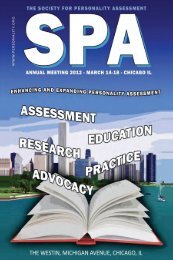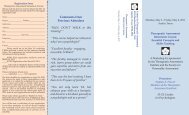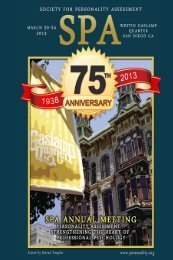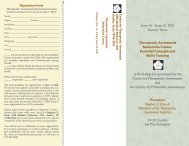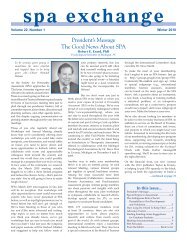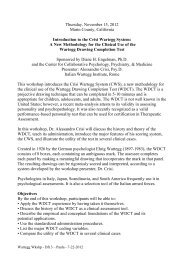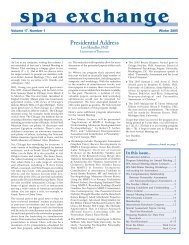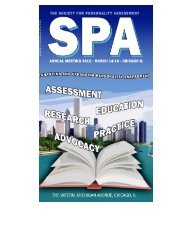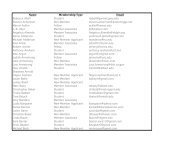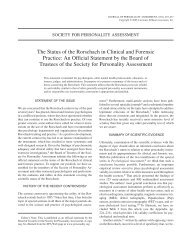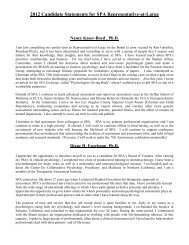From Routledge Journals - Society for Personality Assessment
From Routledge Journals - Society for Personality Assessment
From Routledge Journals - Society for Personality Assessment
Create successful ePaper yourself
Turn your PDF publications into a flip-book with our unique Google optimized e-Paper software.
Workshop #14<strong>Assessment</strong> of Domestic Violence in ChildCustody DisputesRobin Deutsch, Ph.D.Massachusetts General Hospital, Department of PsychiatryBoston, MAIn the past, views on domestic violence resulted in polarization inthe professional community as dissimilar contexts and sampleswere compared. There is increasing acknowledgment among familycourt professionals, custody evaluators, and domestic violenceadvocates that not all domestic violence is the same and the differencesin the use of violence in<strong>for</strong>m custodial and access decisions.This workshop will review these differences with a focus on methodsof assessing violence risks, and the implications <strong>for</strong> childrenand parenting plans. There will be a review of violence risk assessmentinstruments, new research on and thinking about differentiationof domestic violence, and the impact of domestic violenceon parenting practices and child adjustment. Case vignetteswill be used.Goals and Objectives:1. Differentiate types of domestic violence in custody disputes.2. Identify violence risk factors.3. Discuss the ramifications of domestic violence on parenting practices.4. Identify implications of violent behaviors <strong>for</strong> parenting plans.Skill Level: This workshop is appropriate <strong>for</strong> all levels of expertise.Sunday, March 28, 20108:00 am - 4:00 pmFull-Day, 7 CE CreditsWorkshop #15Therapeutic <strong>Assessment</strong> of Adolescents andFamilies2010 WORKSHOPS - MARCH 28Stephen E. Finn, Ph.D.Pamela Schaber, Ph.D.Center <strong>for</strong> Therapeutic <strong>Assessment</strong>, Austin, TexasDeborah Tharinger, Ph.D.University of Texas, Austin, TXPsychological assessment of adolescents is challenging <strong>for</strong> manyreasons, including the difficulty of engaging reluctant teens in anassessment, managing issues of confidentiality and autonomy, andmaintaining an alliance with adolescents and their caregivers simultaneously.Drs. Finn, Schaber, and Tharinger will explain howthe collaborative process of Therapeutic <strong>Assessment</strong> meets eachof these challenges and aims to benefit adolescents and theircaregivers simultaneously. In addition to didactic material, the presenterswill show video excerpts from several different adolescent/familyassessments.Goals and Objectives:1. Discuss how developmental issues of adolescents make psychologicalassessment challenging.2. Discuss how psychological assessment of adolescents ispotentially a family intervention.3. List the steps in Therapeutic <strong>Assessment</strong> with adolescents.4. Describe guidelines <strong>for</strong> managing confidentiality in adolescentassessments and <strong>for</strong> respecting teens’ appropriate needs<strong>for</strong> autonomy.5. Discuss ways to involve caregivers in an adolescent’s assessment.6. Describe various ways to give feedback to teens about theirassessment results.Skill Level: This is an introductory workshop; participantsshould have a basic knowledge of standardized psychologicaltests.Workshop #16Advanced Issues in Child Custody: CurrentResearch, <strong>Assessment</strong>, and Forensic ApplicationsS. Margaret Lee, Ph.D.Robert Kaufman, Ph.DMill Valley, CANancy Olesen, Ph.D.Marjorie Gans Walters, PhD.San Rafael, CASteven Friedlander, PhD.John Sikorski, MDGraeme Hanson, MDSan Francisco, CAThis workshop will address issues frequently faced when conductingchild custody evaluations. The topics will include: attachment,alienation, sexual abuse and personality disorders,particularly in their neurodevelopmental aspects. Each topicalpresentation will include a review of the recent pertinent research,appropriate assessment instruments found to be useful,and the integration of assessment findings with other datacollected in this <strong>for</strong>ensic application.Goals and Objectives:1. Describe elements of basic research in sexual behavior foundin non-abused children of different ages.2. Describe research on aspects of memory in children, bothneurobiological development and situations that increase or decreasethe accuracy of recall.3. Present an example of interaction between constitutionalfactors and environmental factors in personality <strong>for</strong>mation.4. Review current perspectives on alienation and on childrenwho refuse to spend time with or reject a parent after divorce.5. Identify and assess the various factors that contribute to achild’s rejection of a parent.6. Adjust standard evaluation processes to obtain better attachmentdata and will be introduced to attachment measures<strong>for</strong> adults and children.Skill Level: Participants should have a basic understandingof divorce and per<strong>for</strong>ming child custody evaluations.To register visit: www.personality.org / 11



